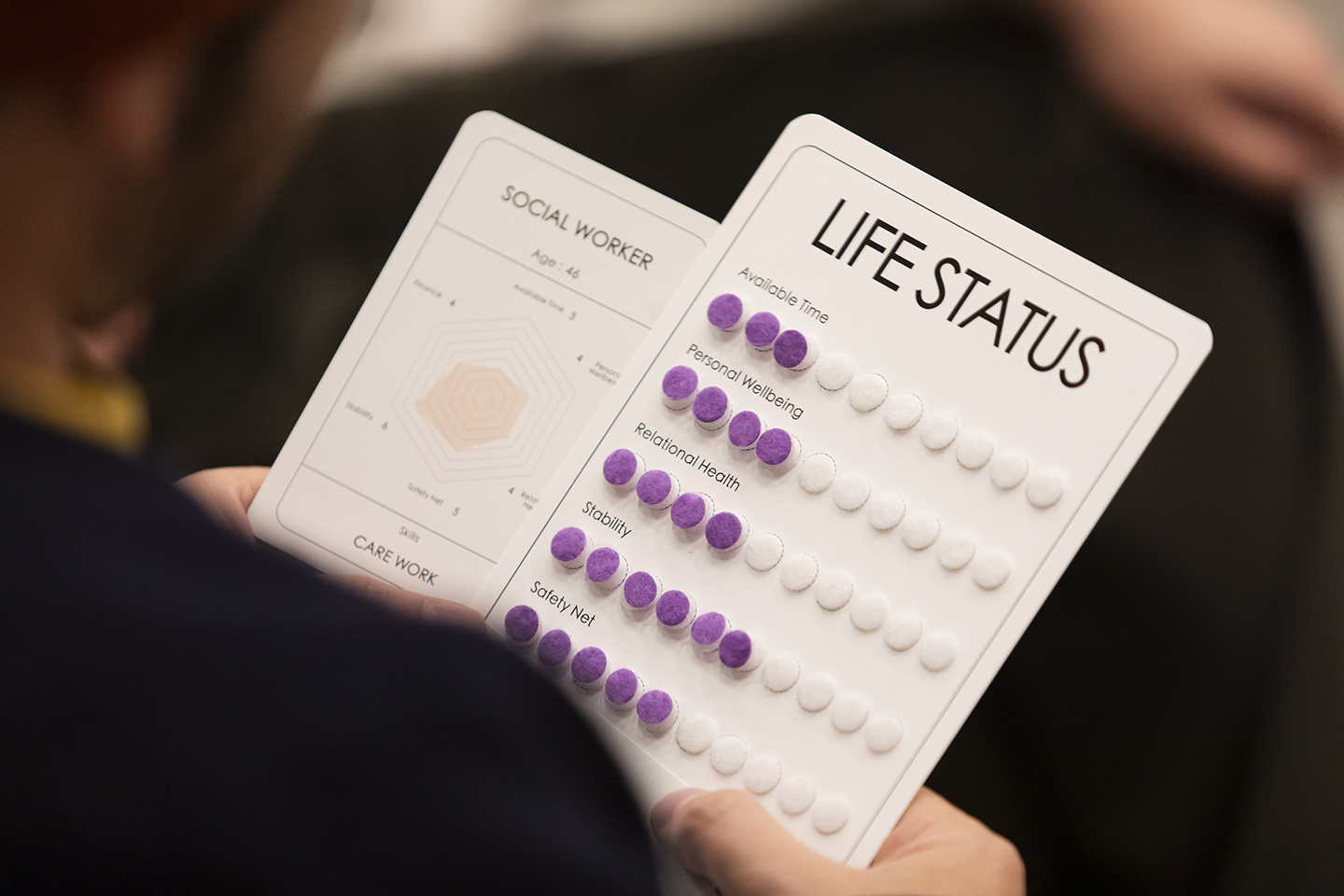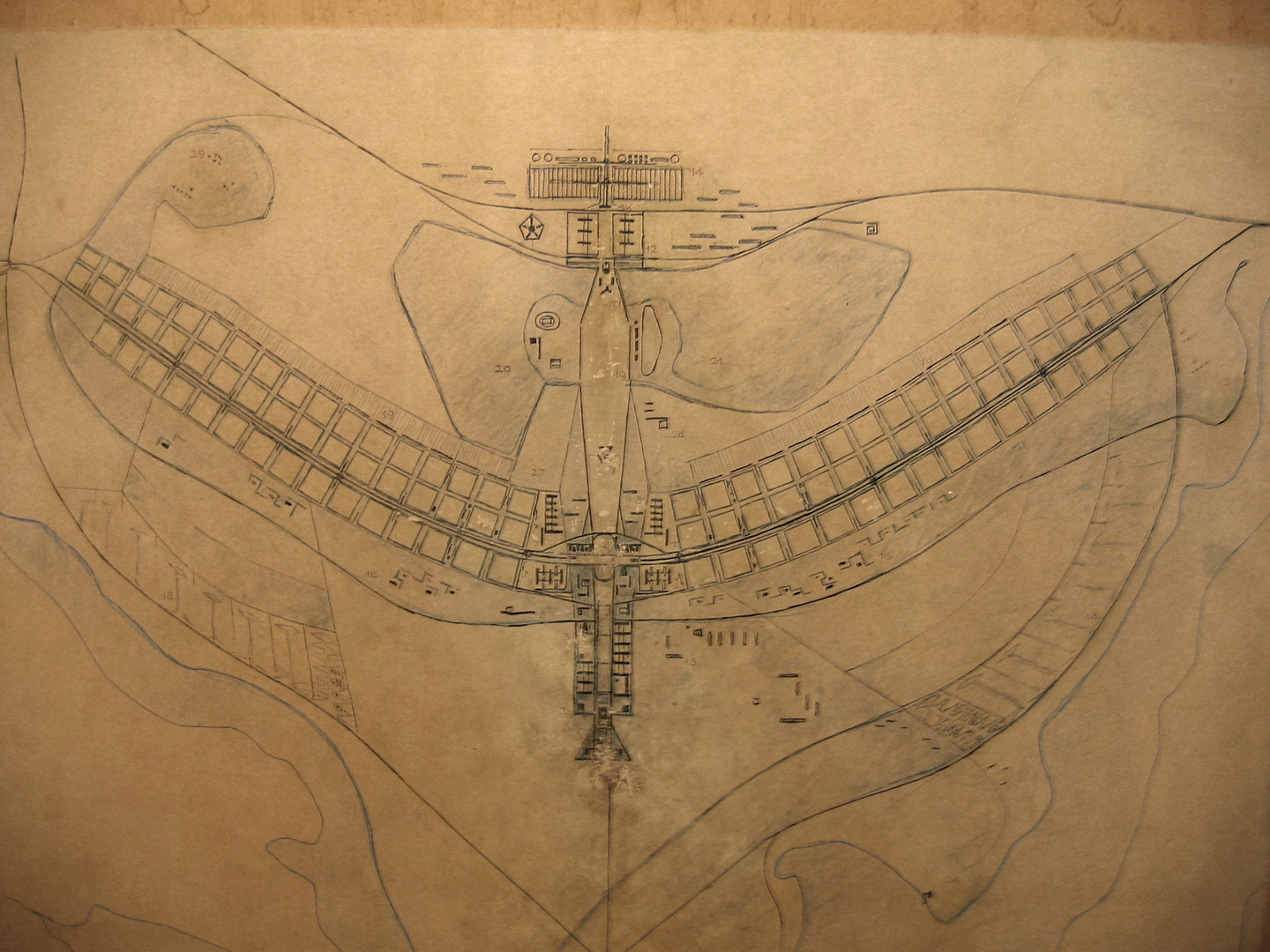
Ludwig Lépcső (The Ludwig Stairs), 2013. Inside view of the protesters on stairs, Ludwig Museum of Contemporary Art, Budapest, Hungary. Photography by Gabriella Csosz.
Does rising pessimism about socially engaged art and political collectivism signal the art world’s fatigue with such work, or simply its latest failure of nerve?
It is no doubt telling that a recent Frieze roundtable with former members of several defunct art groups is entitled “Why Do Art Collectives End?”1 This pessimistic framing is reinforced by an image of a performance in which a half-dozen young white people dressed in clinical, if not indeed funereal-looking, garb have collapsed in painful contortions on what appears to be a modernist museum staircase. How mawkishly apocalyptic can one get! And yet signs that there is a reaction against social agency as an artistic practice are ringing bells of warning all around us. For example, in this roundtable about the end of collective formations, only the artist and activist Todd Ayoung defends the idea that social organizing amongst artists has also been a political choice, as opposed to merely an artistic affect or vogue. “What I’m hearing,” says Ayoung, “is that your groups were founded on the pretext of having fun, whereas a lot of the groups I’ve been a part of—REPOhistory, for instance, was a large group of left-leaning writers, performance artists and visual artists—wanted to address real political issues.” Almost two decades earlier I also attempted something critically similar with a stinging 2004 letter to Artforum entitled “Introducing Insouciant Art Collectives, the Latest Product of Enterprise Culture.”2 My commentary got straight to the point: “For those who crave cultural distraction without the heavy intellectual price tag now comes a pack of new and inscrutable art collectives offering colorful, guilt-free fun.” It ended with the observation that a certain cleansing of artistic collectivism’s radical ambitions was underway:
De-contamination of collective [artistic] politics permits the individualistically centered art world to “bond” with its antithesis safely and without any serious disruption of its market for discretely authorized products. Therefore these groovy new art groups do not only appear freshly minted but—thanks to an endemic historical amnesia on the part of curators, art historians, administrators, critics and sadly even artists—entities such as Forcefield et al. actually appear (choke) radical, at least from within the circumscribed horizon of contemporary art.
Today there seems to be a distinct trend emerging that seeks to dismiss even this fluffy form of artistic collectivity, as if the very emphasis on sociality itself was becoming anathema, or, worse perhaps, simply boring. We can glimpse markers of this liberalist entertainment fatigue in responses to the recent Halperin Report (2022), whose data shows just how superficial is much of the apparent advancement museums have made regarding issues of equality—especially in the areas of race, gender, and sexuality (class, unfortunately, though not surprisingly, is left unexamined).3 Summarily snapping that “we decided to do the math,” the report states that “the art world’s perception of progress far outpaces reality.” Not a terribly surprising conclusion if one adopts a more economically historical perspective, but nevertheless sobering. Commenting on these glum findings, art critic Ben Davis rightfully retorts that “without money behind social justice demands, you are left with fleeting gestures and moralistic browbeating, ultimately preparing the ground for cynicism and backlash.”4 Although his overall analysis tends to fall into the stock journalese of “there goes the ol’ pendulum swinging again,” here Davis hits an unshakable note of de-spirited precision.
More foreboding bells are ringing in the aftermath of high-level art world exits (or outright dismissals), including the highly progressive Manuel Borja-Villel as director of the Reina Sofía Museum in Madrid, or the “red” slipping of the politically engaged Croatian curatorial collective WHW in Vienna, or the entire brouhaha over the ruangrupa collective and Documenta 15 this past summer. Additionally, along with the Frieze roundtable and Davis’s piece, we also find critic Kate Brown speculating in a thinly researched article that “Art Collectives Were the Talk of the Art World in the Last Few Years. Has Their Moment Passed?”5 If this is the start of a counter-progressive shift, it would of course be in keeping with the accelerating pace of conservative, far-right, and outright fascist politics around the globe, a distressing phenomenon that Grant Kester’s FIELD: Journal of Socially Engaged Art Criticism sought to delineate in 2019 with a special issue I edited that included over thirty contributors (not nearly enough, I admit) from both the Global South and North, entitled “Art, Anti-Globalism, and the Neo-Authoritarian Turn.”6 I am not sure what lessons might be extracted four years on from these reports, but I leave it to readers to make comparisons, criticisms, or concessions about the need for a new “Optimism of the Will” that can resist the counter-progressivist turn that is now creeping up on us from all around.7
Originally published in Gregory Sholette’s Substack newsletter, “Our Bare Art World,” February 26, 2023. On March 2, Sholette published on his blog a short response to this article from Todd Ayoung. It is reproduced here in full:
Countering a Counter Progressive Turn or, Why Should There Be No Endgame to (Art) Collectives?
The title of this short response is the discussion I would rather have been involved with.
I do not see collective struggle, the way I understand it, as ever coming to a closure, but being an ongoing futuring of the now. Collectivities are self-determinations and, in my imaginings, decolonial non-extractive existential freedoms (read Black and Indigenous Existential Freedom) intensifying across the imaginary and real of the now. This collective constancy is a reimagining and the actualization of the social and political collective community under-conscience. It is a much-needed contemporary mutual strategy for challenging the contemporaneity of the climate disaster, and the international political nuclear nationalist fantasies of surviving a mutual annihilation.
All Collectives Are Not the Dominant Colonial SAME of White Nationalism
The collective formations I have been involved with, from REPOhistory to Interim Sites: An Urban Arts Initiative, Godzilla, the Asian Pacific Islander Arts Network, Artist of Color Bloc, Peoples Cultural Plan, and GulfLabor, were intersectional struggles to reimagine concretely a social and political system that is anti-racist, anti-capitalist, and decolonial, and that simultaneously confronts the dominant reproductions of class, sexuality, and gender privilege.
So Greg Sholette is on point in his response in “A Counter-Progressive Turn?” that class is very much overlooked in the March 2023 Frieze interview about art collective dyings.
The Revolution Will Not be Zoomed
The Frieze interview reads—and I take partial responsibility for being involved with agreeing to the edits to this hour-plus Zoom roundtable discussion—more as an art collective spectacle. It mimics the dominant impression of what the collective over-conscience imagines collectives are as an adjective and a noun. It is a posturing of political collectivism without self-determination, a youthful misadventure with misgivings and fun, not unlike the comedies and tragedies of trendy tabloid high-art rock-and-roll bands.
Personally, I do not feel the conviction of art collective progressive struggle in the Frieze interview, not in the way I felt it when I participated in the art collectives mentioned above. My collective experience is with on-the-ground social and political transformations that are applied to all my social encounters, artistic or not (for example, my participation in the longest adjunct faculty strike in US labor history at the New School, NYC). But to think this, according to the roundtable, is to be pretentious.
This is the problem with collective spectacles. It is the walking dead without a progressive futuring in the now.
Todd Ayoung, Patterson Beckwith, Simon Bedwell, Vanessa Disler, and Dena Yago, “Why Do Art Collectives End?” Frieze, no. 233 (March 2023) →.
See →.
See “Is Progress in the Art World Just a Mirage?” December 16, 2022, in The Art Angle, podcast →.
Ben Davis, “Is the Art World Entering the Age of ‘Anti-Woke’ Backlash? Here’s Why Today’s Reaction Will Look Very Different From Decades’ Past,” Artnet News, December 20, 2022 →.
Kate Brown, “Art Collectives Were the Talk of the Art World in the Last Few Years. Has Their Moment Passed?” Artnet News, February 9, 2023 →.
FIELD, no. 12–13 (Spring 2019) →.
Greg Sholette, “Optimism of the Will: 2018 FIELD Reports on the Global Resistance to Neoreactionary Nationalism,” FIELD, no. 12–13 (Spring 2019) →.


















